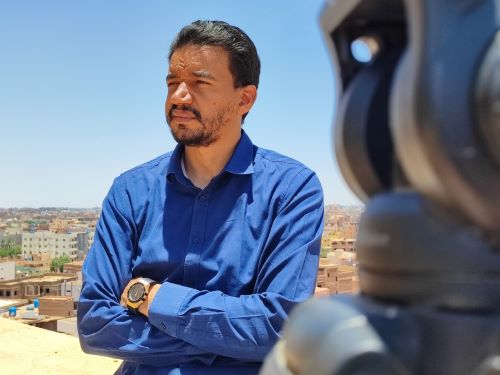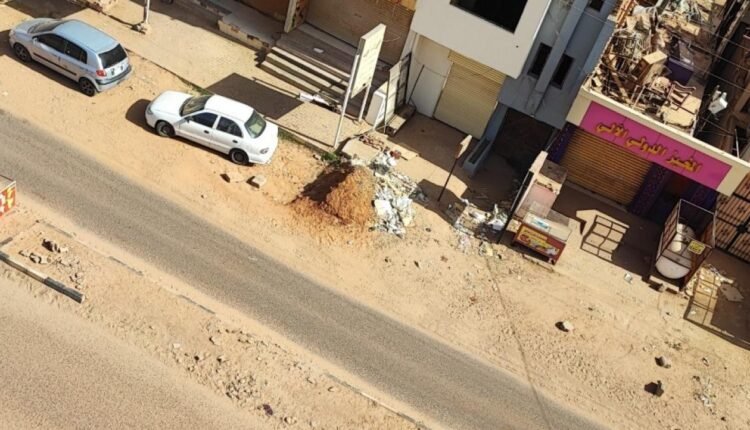The outbreak of armed clashes in Sudan between the paramilitary Rapid Support Forces (RSF) and the Sudanese Armed Forces on April 15 have placed journalists in harm’s way, and exacerbated the challenges they face on the job.
Because of the crisis, 250 journalists have changed careers, the Sudanese Journalists’ Syndicate found. Another 250 are recently unemployed. “If conditions stay the same, journalism in Sudan will vanish,” Abu Idris said.
IJNet Arabic spoke with two Sudanese journalists about their experiences reporting on the ongoing crisis, and the risks fellow media workers face in Sudan today. Here is what they had to say.
The dangers of reporting
In late April, the Sudanese Journalists’ Syndicate announced that the Sudanese Armed Forces had assaulted a BBC correspondent in Khartoum. A number of journalists were also trapped in their offices due to the armed conflict.
Newsroom offices in downtown Khartoum were also bombed, said Eman Kamal El-Din, a journalist for Sudan Press. “Some journalists were subjected to violations and suppression during covering clashes.”
Iman said she spent the first days of the armed conflict in a besieged area near an RSF camp in Bahri city, in north Khartoum. “With power and water outages in this area, I cannot describe the day as normal,” she said. “We are stuck between risks and hunting for information as much as possible. During the clashes, I published breaking news for the outlet I work for about renewed fights, airplanes, and heavy artillery.”
A difficult and uncertain situation
“It’s really difficult to see the destruction and the dead bodies in the streets and report at the same time,” said Sudanese journalist and Al-Arabiya’s correspondent in Khartoum, Salem Al-Hashemi. “The two warring parties are not satisfied with our news and information. This is a disturbing situation for journalists but reassuring at the same time because this is the right reporting of the situation.”

Sudanese journalist Salem al-Hashemi
Journalists’ independent coverage, especially in areas where armed clashes occur, can endanger their lives. Al-Hashemi, for one, has received death threats.
“I took these threats seriously and informed the authorities. I do my job normally despite the uncertainty, especially since there are no laws or commitments from the two [factions] to protect journalists or respond to their requests to conduct interviews or report in some areas under their control,” he explained.
The first three days of the clashes were especially trying, noted Al-Hashemi, given how they occurred around the end of Ramadan. “The destruction and the dead bodies in the streets were shocking, and [the time I could rest] was no more than one hour daily,” he said.
Tips and guidance to correspondents reporting in Sudan
- Journalists should properly prepare for field work. They should assess danger in advance, weigh potential risks and plan how to respond to them.
- Digital safety is critical. Journalists should use secure communication apps to safeguard their personal data.
- Exercise increased caution when using social media, and don’t provide any information to authorities or armed groups that could put your security at risk.
- Prepare safety equipment and carry first aid kits.
- Rest and prioritize mental wellbeing. Working in a dangerous setting, under difficult conditions, and for long hours has a negative impact on correspondents’ psychological and physical health.
Resources and opportunities for journalists in Sudan
- UNESCO has developed a useful safety guide for journalists working in dangerous environments.
- Rory Peck Trust provides practical and financial support to freelance journalists and their families worldwide. It also assists them in times of crisis and helps them work securely and professionally while covering conflicts.
- Internews’ Emergency Fund: Internews launched a fundraising campaign for journalists in Sudan through its Emergency Fund. The campaign aims to provide financial support for journalists, safety equipment, medicine, and psychological support.
- The International Federation of Journalists’ Safety Fund provides financial support to journalists working in conflict and dangerous areas, including in Sudan.
- Reporters Respond Fund is an emergency fund that provides direct help and legal support and guidance related to the safety of journalists and afflicted media organizations.
- Journalists in Distress lists the most important funds and organizations that support journalists working in conflict zones.
Photos courtesy of the Sudanese journalist Salem Al-Hashemi.
This story was originally published in IJNet Arabic and translated by Lina Elshrief.



